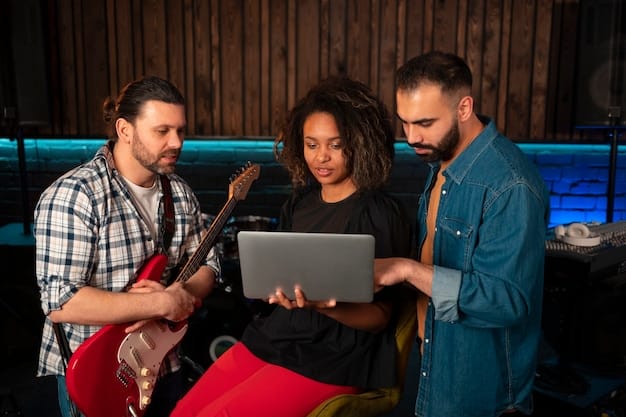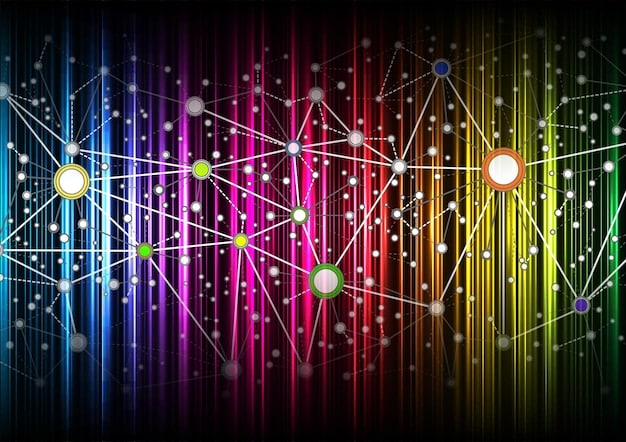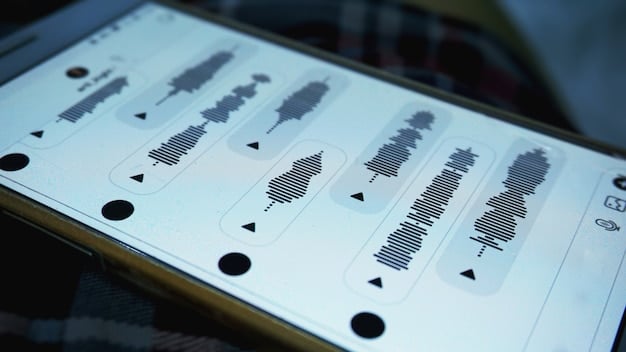Music Industry Revolution: 4 Shifts Empowering US Artists

The music industry revolution in the US is empowering artists through direct-to-fan engagement, decentralized music platforms, data analytics for personalized experiences, and new revenue streams like NFTs and blockchain technologies.
The **music industry revolution: the 4 key shifts empowering artists in the US right now** are creating unprecedented opportunities for musicians to connect with fans, control their careers and generate income in new and innovative ways. It’s an era of empowerment, putting the creative force back in the hands of the artists themselves.
Direct-to-Fan Engagement: Building Authentic Connections
Direct-to-fan engagement is one of the pivotal shifts in the music industry, allowing artists to bypass traditional gatekeepers and forge genuine relationships with their audience. Social media, email lists, and exclusive content platforms now serve as direct lines of communication, enabling artists to cultivate loyalty and build a sustainable fanbase.
The Power of Social Media
Platforms like Instagram, TikTok, and YouTube have become essential tools for artists to share their music, behind-the-scenes content, and personal stories. Consistent and engaging content keeps fans connected and attracts new listeners.
Creating Exclusive Experiences
Offering exclusive content, such as early releases, behind-the-scenes footage, and personalized merchandise, is another powerful way to connect with fans. These exclusive experiences create a sense of belonging and reward dedicated supporters.
- 🎁 Exclusive merchandise and limited editions create a sense of value.
- ✉️ Personalized messages and shout-outs strengthen fan loyalty.
- 🎥 Behind-the-scenes content offers a peek into the artist’s creative process.
- 🎫 Early access to tickets and releases rewards dedicated fans.
By cutting out the middleman, artists take ownership of their brand and control the narrative surrounding their music. This direct connection fosters a more authentic relationship between artists and fans, leading to increased engagement and long-term loyalty.
Decentralized Music Platforms: Reclaiming Ownership
Decentralized music platforms are emerging as a groundbreaking alternative to traditional streaming services, promising fairer compensation and greater control for artists. These platforms leverage blockchain technology to create a more transparent and equitable ecosystem.

The Promise of Blockchain
Blockchain technology allows for transparent tracking of music rights and royalties, ensuring artists receive a larger share of the revenue generated by their work. Smart contracts automate royalty payments, reducing the potential for disputes and delays.
Exploring New Platforms
Platforms like Audius and Emanate are pioneering decentralized music streaming, offering artists a more equitable share of revenue and greater control over their music. These platforms often incorporate features like cryptocurrency payments and NFT integration.
- 🎵 Fairer royalty rates compared to traditional streaming services.
- 💸 Direct payments and reduced reliance on intermediaries.
- 🔗 Greater control over music rights and distribution.
- 🛡️ Transparent tracking of royalties and usage.
Decentralized platforms empower artists to reclaim ownership of their music and build a more sustainable career. By leveraging blockchain technology, these platforms are reshaping the landscape of the music industry, creating a more equitable and transparent ecosystem.
Data Analytics for Personalized Experiences: Understanding Your Audience
Data analytics is revolutionizing the way artists understand and connect with their audience, enabling them to create personalized experiences and tailor their music to meet the preferences of their fans. By analyzing data from streaming services, social media, and ticket sales, artists gain valuable insights into their listeners’ behavior and preferences.
Harnessing the Power of Data
Artists can use data to identify their most engaged fans, understand their listening habits, and create targeted marketing campaigns. This data-driven approach maximizes the impact of promotional efforts and helps artists build stronger relationships with their audience.
Personalized Recommendations
Streaming services use data to create personalized recommendations, introducing listeners to new music and artists based on their listening history. Artists can leverage this data to optimize their music for discovery and reach a wider audience.

By understanding their audience’s preferences, artists can create more relevant and engaging experiences. This personalized approach resonates with fans, fostering a deeper connection and driving long-term loyalty.
New Revenue Streams: NFTs and Blockchain Technology
New revenue streams like NFTs (Non-Fungible Tokens) and blockchain technology are opening up exciting opportunities for artists to monetize their creativity and connect with fans in unique ways. NFTs provide a secure and transparent way to sell digital assets, while blockchain technology ensures fair compensation and ownership rights.
The Rise of NFTs
NFTs allow artists to sell limited-edition digital collectibles, such as music, artwork, and virtual experiences. These digital assets can be traded and collected, creating a new avenue for revenue and fan engagement.
Blockchain for Royalties
Blockchain technology is also being used to streamline royalty payments, ensuring artists receive a fair share of the revenue generated by their music. Smart contracts automate royalty distribution, reducing the potential for disputes and delays.
- 🖼️ Selling exclusive artwork, music, and virtual experiences as NFTs.
- 🔑 Providing access to exclusive content and communities through NFT ownership.
- 🤝 Building stronger fan communities through NFT-based rewards.
- ⚖️ Ensuring fair compensation through blockchain-based royalty systems.
By embracing these new technologies, artists are diversifying their income streams and building a more sustainable career. NFTs and blockchain technology offer exciting new ways for artists to connect with fans, monetize their creativity, and reclaim ownership of their work.
The Importance of Mental Health and Well-being
The shift towards artist empowerment, while offering incredible opportunities, also brings new challenges such as increased pressure and the need to manage multiple aspects of a career. Prioritizing mental health and well-being is essential for artists to thrive in this evolving landscape.
Seeking Support and Resources
Many organizations offer resources and support for musicians, including mental health services, financial guidance, and legal advice. Taking advantage of these resources can help artists navigate the challenges of the industry and maintain a healthy work-life balance.
Building a Support Network
Surrounding oneself with a supportive network of friends, family, and mentors is crucial for maintaining mental well-being. Sharing experiences and seeking advice from trusted sources can provide valuable perspective and help artists stay grounded.
Focusing on mental health and well-being allows musicians to sustain their passion, creativity, and drive. By prioritizing self-care, they can navigate the music industry revolution with resilience and continue to make a lasting impact on their audiences.
Navigating the Future Music Industry Landscape
As the music industry continues its revolution, artists must embrace innovation and adapt to new technologies. Staying informed about the latest trends, connecting with other artists, and continuously exploring new opportunities will contribute to success and sustainability.
Embracing New Technologies
From decentralized platforms to AI-powered music tools, new technologies are constantly emerging. Artists who embrace these advancements can gain a competitive edge and create more engaging experiences for their audience.
Collaborating and Networking
Building relationships with other artists, producers, and industry professionals is essential for success. Collaborations can open doors to new opportunities and provide valuable support and mentorship.
Navigating the future music industry landscape requires resilience, adaptability, and a willingness to embrace change. Artists who combine their creative talent with a strategic mindset will be best positioned to thrive in this dynamic and empowering era.
| Key Shift | Brief Description |
|---|---|
| 🤝 Direct-to-Fan Engagement | Artists connect directly with fans, building authentic relationships. |
| 💰 Decentralized Platforms | Fairer compensation and greater control over music rights. |
| 📊 Data Analytics | Personalized experiences and targeted marketing strategies. |
| 🚀 New Revenue Streams | NFTs and blockchain technology for unique monetization. |
FAQ
▼
Direct-to-fan engagement allows artists to build authentic relationships with their audience, bypassing traditional gatekeepers. This fosters loyalty, increases revenue, and provides artists with valuable feedback.
▼
Decentralized music platforms use blockchain technology to offer fairer compensation and greater control for artists. These platforms ensure transparent tracking of royalties and direct payments.
▼
Data analytics provide artists with insights into listener demographics, preferences, and engagement patterns. This enables them to create targeted marketing campaigns and personalized experiences.
▼
NFTs (Non-Fungible Tokens) allow artists to sell unique digital assets, such as music, artwork, and virtual experiences. These digital collectibles create new revenue streams and engage fans in innovative ways.
▼
Prioritizing mental health and well-being is essential for artists to navigate the pressures of the modern music industry. Accessing support and building a network is crucial for maintaining resilience and creativity.
Conclusion
The music industry revolution is empowering US artists through direct engagement, decentralized platforms, data analytics, and new revenue streams. Embracing these shifts can lead to sustainable careers and meaningful connections with fans, making it an exciting era for musicians.





